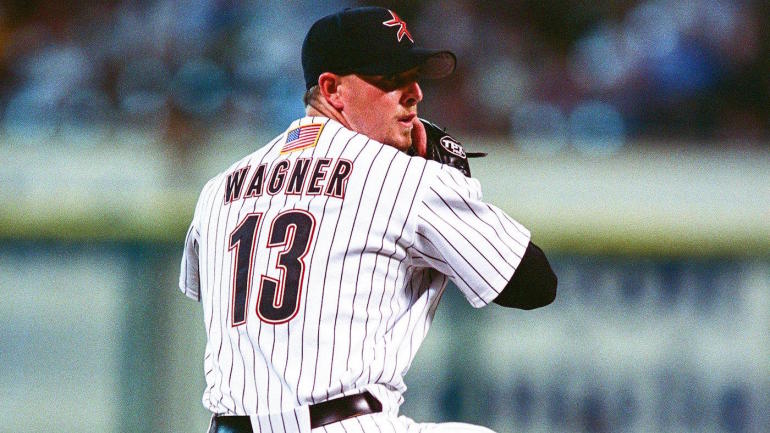
The 2021 Baseball Hall of Fame voting cycle marks the sixth for former superstar closer Billy Wagner. He started with 10.5 percent of the vote in 2016 and jumped up to 31.7 percent last year. He appears to be making good progress this time around, too, via Ryan Thibodaux's ballot tracker. It really looks like it might go down to the wire before his 10 years are up.
Should it? Let's examine Wagner's case.
First off, we have to discuss relief pitchers. There is some notion floating around out there that every single reliever is a failed starter, and that's just not true. Wagner isn't. He was a good starter in both Double-A and Triple-A, yet he never made a major-league start due to circumstance. The Astros, upon calling him up, needed bullpen help more than rotation help. In 1997, the plan was to use him in long relief but he started to dominate in his short stints and the permanent move to closer was made. The "why mess with success" principle was applied.
It's also true that it's much "easier" -- on a relative scale, of course -- for a pitcher to succeed as a reliever than a starter. One can throw much harder and use a smaller arsenal of pitches when only working in short stints and not having to see a hitter more than once in a game. Wagner's fastball played up as one of the best of all time, in that era. He threw 101 miles per hour despite his diminutive frame (Wagner was listed at 5-foot-10). Alan Ashby, who caught Nolan Ryan and J.R. Richard, among others, once said Wagner's heat was the best he ever saw. Had he been a starter, things would've looked different.
As such, here's where I fall on relievers in the Hall of Fame: It's possible to merit inclusion, but the bar needs to be much higher. Mariano Rivera, for example, is an obvious, slam-dunk, no-doubt Hall of Famer. Joe Nathan, who comes onto the Hall of Fame ballot next year, is eighth in career saves and a six-time All-Star with a 151 career ERA+. I fall in the "no" camp on Nathan. The bar is between him and Rivera.
That's a high but not impossible standard.
I think Wagner clears the bar, but I'm not sure. This year was the first time on my hypothetical ballot I included Wagner. I'd be fine with him making it. I'd be fine with him missing it. He's borderline to me and I really don't think there's a right answer. Not only do we have the above points when it comes to relievers, but usage of closers has already changed so much in just a few decades and it is in the midst of undergoing another metamorphosis, league-wide.
Judging Wagner against closers like Goose Gossage and Rollie Fingers is nearly impossible, because between those eras the transition was made from multi-inning firemen to one-inning closers. We shouldn't compare Wagner to Rivera, because no one is Rivera. You don't keep right fielders out of the Hall of Fame for not being Hank Aaron.
Someone who does work here as a comparison is Trevor Hoffman. Hoffman was active from 1993-2010 while Wagner was active from 1995-2010. They were much different pitchers in approach, sure, but they played in the same era and mostly the same usage patterns.
Hoffman had 28 WAR in his career compared to 27.7 from Wagner. They are tied in JAWS.
Wagner had 422 saves in 491 chances (86 percent). Hoffman saved 601 in 677 (89 percent).
Wagner had a 2.31 ERA, 187 ERA+, 0.998 WHIP and 11.9 K/9. Hoffman sits at a 2.87 ERA, 141 ERA+, 1.058 WHIP and 9.4 K/9. Wagner held opposing hitters to a .187/.262/.296 line in his career. Hoffman allowed a .211/.267/.342 slash.
Workload is a bit of a separation point, as Hoffman pitched 1,089 1/3 innings compared to Wagner's 903 and that's where the huge lead in saves comes through. Hoffman had more durability and longevity.
It's also clear that Wagner was the more dominant of the two in run prevention, keeping opposing hitters off base and missing bats. In fact, his 187 ERA+ trails only Rivera in baseball history among relievers qualified and eligible for the Hall of Fame.
Wagner's 903 innings would be the lowest total for a Hall of Fame reliever, but, again, look at the way the modern use of the closer has changed. Here are the innings totals of some recent or current elite closers:
- Jonathan Papelbon: 725 2/3 IP
- Kenley Jansen: 636 IP
- Craig Kimbrel: 568 2/3 IP
- Aroldis Chapman: 547 1/3 IP
I'm not saying any of these guys should be Hall of Famers, necessarily, but that's the best MLB has to offer since Wagner and then Nathan (who worked 923 1/3 innings in his career) and it should illustrate we're either done with Hall of Fame relievers or there should be an adjustment on workload judgement. And to reiterate, Wagner is comfortably above those four guys in workload.
Wagner is one of the toughest yes or no decisions on the Hall of Fame ballot for me, and it all boils down to how to judge relievers. That task will only get tougher as we move into weighing the cases of Nathan, Jansen, Kimbrel et al. For now, though, Wagner's dominance in over 900 innings is good enough for me. He's a yes.


















